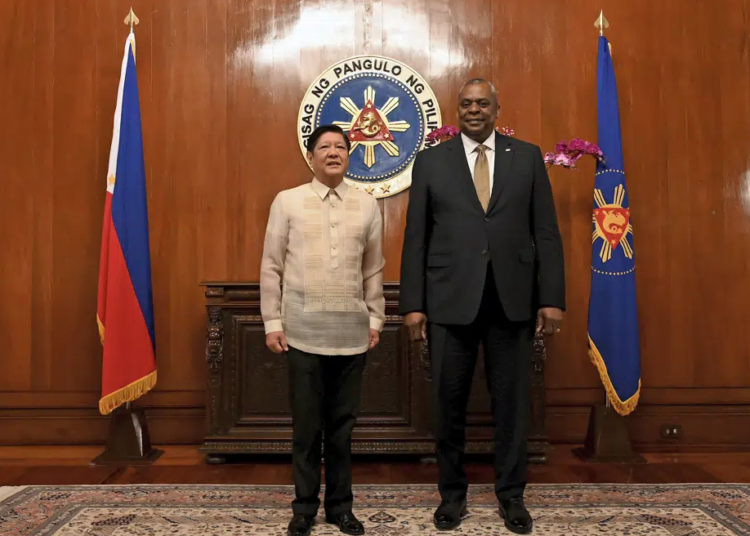MANILA, Philippines — The United States and the Philippines announced an expansion of America’s military presence in the Southeast Asian country on Thursday, with US forces granted access to four more military camps, effectively giving Washington new ground to ramp up deterrence against China.
The agreement between the longtime allies was made public during the visit of US Secretary of Defense Lloyd Austin, who has led efforts to strengthen America’s security alliances in Asia in the face of China’s increasing assertiveness toward Taiwan and territorial disputes in the South China Sea.
The allies also said that “substantial” progress has been made in projects at five Philippine military bases, where US military personnel were earlier granted access by Filipino officials. Construction of American facilities at those locations has been underway for years but has been hampered by unspecified local issues.
Austin thanked President Ferdinand Marcos Jr., whom he briefly met in Manila, for allowing the US military to broaden its presence in the Philippines, Washington’s oldest treaty ally in Asia.
“I have always said that it seems to me that the future of the Philippines and for that matter the Asia-Pacific will always have to involve the United States simply because those partnerships are so strong,” Marcos told Austin.
American leaders have long sought to reorient US foreign policy to better reflect the rise of China as a significant military and economic competitor.
Thursday’s announcement comes as tensions between China and Taiwan have risen. China claims the self-ruled island as its own territory — to be taken by force if necessary — and Beijing has sent warships, bombers, fighter jets and support aircraft into airspace near Taiwan on a near-daily basis, sparking concerns of a potential blockade or military action.
China and the Philippines, along with Vietnam, Malaysia, Brunei and Taiwan, have also been locked in increasingly tense territorial disputes over the busy and resource-rich South China Sea. Washington lays no claims in the strategic waters but has deployed its warships and fighter and surveillance aircraft for patrols that it says promote freedom of navigation and the rule of law but have infuriated Beijing.
In a televised news conference with his Philippine counterpart, Carlito Galvez Jr., Austin gave assurances of US military support and said the 1951 Mutual Defense Treaty, which obligates the US and the Philippines to help defend each other in major conflicts, “applies to armed attacks on either of our armed forces, public vessels or aircraft anywhere in the South China Sea.”
“We discussed concrete actions to address destabilizing activities in the waters,” Austin said without elaborating. “This is part of our effort to modernize our alliance and these efforts are especially important as the People’s Republic of China continues to advance its illegitimate claims in the West Philippine Sea.”
Chinese Foreign Ministry spokeswomen Mao Ning accused the US on Thursday of pursuing “its selfish agenda” with the new arrangement. Beijing has long been criticized US-Philippine military cooperation as an effort to contain its growing influence.






Discussion about this post